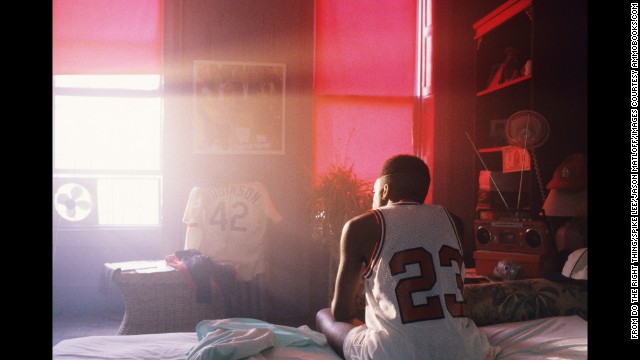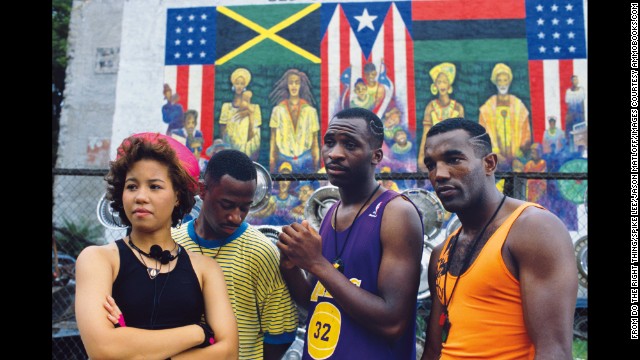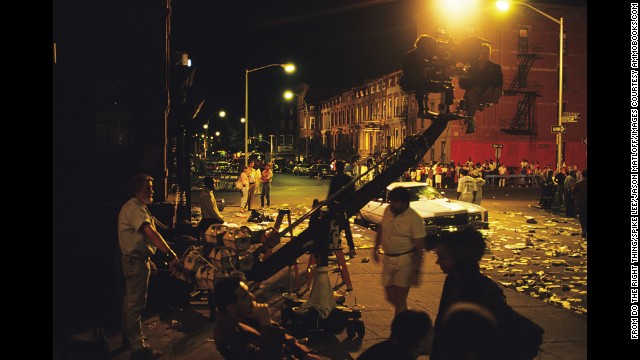 Spike Lee's film "Do the Right Thing" was released on June 30, 1989. Critics were concerned that the controversial motion picture, which took on a number of hot-button issues, would inflame passions. Instead, it provoked dialogue -- and has since become a classic. Click through to see images taken on set and published in the book "Do the Right Thing" by Spike Lee and Jason Matloff.
Spike Lee's film "Do the Right Thing" was released on June 30, 1989. Critics were concerned that the controversial motion picture, which took on a number of hot-button issues, would inflame passions. Instead, it provoked dialogue -- and has since become a classic. Click through to see images taken on set and published in the book "Do the Right Thing" by Spike Lee and Jason Matloff.  The film is set on a hot day in Brooklyn, New York, and follows the lives of several characters. One of them, Radio Raheem (Bill Nunn), likes to walk around the neighborhood playing Public Enemy's "Fight the Power" at high volume, annoying some and entertaining others.
The film is set on a hot day in Brooklyn, New York, and follows the lives of several characters. One of them, Radio Raheem (Bill Nunn), likes to walk around the neighborhood playing Public Enemy's "Fight the Power" at high volume, annoying some and entertaining others.  "Do the Right Thing" was shot on location in Brooklyn's Bedford-Stuyvesant neighborhood. Among the performers with small roles was Martin Lawrence, second from left.
"Do the Right Thing" was shot on location in Brooklyn's Bedford-Stuyvesant neighborhood. Among the performers with small roles was Martin Lawrence, second from left.  Sal, played by Danny Aiello, right, owns a local pizzeria, an Italian in what's become an African-American neighborhood. His son Pino (John Turturro) is prejudiced against the locals. The pizzeria, a neighborhood gathering spot, eventually becomes the center of trouble.
Sal, played by Danny Aiello, right, owns a local pizzeria, an Italian in what's become an African-American neighborhood. His son Pino (John Turturro) is prejudiced against the locals. The pizzeria, a neighborhood gathering spot, eventually becomes the center of trouble.  Rosie Perez plays Tina, girlfriend of Spike Lee's pizza delivery man, Mookie. The pair have a young son, but little hope: Mookie is immature and Tina is struggling. On this hot day, it's all she can do to simply keep cool.
Rosie Perez plays Tina, girlfriend of Spike Lee's pizza delivery man, Mookie. The pair have a young son, but little hope: Mookie is immature and Tina is struggling. On this hot day, it's all she can do to simply keep cool.  Radio Raheem wears "love" and "hate" on his rings, a reflection of the neighborhood's volatility (and a nod to Robert Mitchum's preacher character in "Night of the Hunter," who has the words tattooed on his knuckles). Another character, a mentally challenged man named Smiley, sells pictures of Malcolm X and the Rev. Martin Luther King Jr., another symbol of duality.
Radio Raheem wears "love" and "hate" on his rings, a reflection of the neighborhood's volatility (and a nod to Robert Mitchum's preacher character in "Night of the Hunter," who has the words tattooed on his knuckles). Another character, a mentally challenged man named Smiley, sells pictures of Malcolm X and the Rev. Martin Luther King Jr., another symbol of duality.  Sal's son Pino (Turturro) has a tense relationship with Mookie (Lee). His other son, Vito (Richard Edson), is friendly with the delivery man. Still, the trio's conversation often resolves nothing and highlights the gulf between them.
Sal's son Pino (Turturro) has a tense relationship with Mookie (Lee). His other son, Vito (Richard Edson), is friendly with the delivery man. Still, the trio's conversation often resolves nothing and highlights the gulf between them.  Samuel L. Jackson plays local DJ "Mister Senor Love Daddy," whose mellifluous chatter continually comments on the day. Jackson had a major role in Lee's next film, "Jungle Fever," which proved to be his big break.
Samuel L. Jackson plays local DJ "Mister Senor Love Daddy," whose mellifluous chatter continually comments on the day. Jackson had a major role in Lee's next film, "Jungle Fever," which proved to be his big break.  Among the set visitors was Eddie Murphy, left, then at the height of his fame. He and Lee, right, had a sometimes rocky relationship, with Lee criticizing Murphy for not using his clout to help African-Americans in the movie business.
Among the set visitors was Eddie Murphy, left, then at the height of his fame. He and Lee, right, had a sometimes rocky relationship, with Lee criticizing Murphy for not using his clout to help African-Americans in the movie business.  "Do the Right Thing" ended up both a financial and critical success. The film was nominated for Oscars in two categories best supporting actor (Danny Aiello) and original screenplay (Spike Lee). The film was ranked the 96th greatest of all time in a 2007 American Film Institute survey.
"Do the Right Thing" ended up both a financial and critical success. The film was nominated for Oscars in two categories best supporting actor (Danny Aiello) and original screenplay (Spike Lee). The film was ranked the 96th greatest of all time in a 2007 American Film Institute survey.
- "Do the Right Thing" came out 25 years ago Monday
- Film made some critics anxious, but all it stoked was conversation
- Movie drew from racial events of the era
(CNN) -- You can still feel the heat from "Do the Right Thing."
Though the Spike Lee Joint, about the angry events of a scorching hot day in Brooklyn, looks a bit dated these days -- gone are the boomboxes and fade haircuts of the late '80s -- there's no fighting the film's power.
The issues raised by the film -- gentrification, ethnic clashes, police presence, the impact of violence -- remain topical.
So does its thoughtfulness, something that was overlooked, both then and later. "Do the Right Thing" was released 25 years ago Monday.
It had a reputation before it even opened. "Do the Right Thing" would doom race relations, said critics. Riots would engulf the multiplex. One can only imagine the fear that would have been stoked in the Internet age.
Instead, what audiences found was a film more infused with sadness (and humor!) than anger, less black and white than shades of gray.
Sal, the pizzeria owner played by Danny Aiello, was gruff but fatherly. Mookie, Lee's delivery man character, was immature but not mean. The rest of the characters -- the music-loving Radio Raheem (Bill Nunn), the drunken Mayor and Mother Sister (Ossie Davis and Ruby Dee), even the pot-stirring Buggin Out (Giancarlo Esposito) -- were humans, not props.
New York has changed in 25 years. Today blacks and Italians both listen to hip-hop, the pop music of our times. The Bedford-Stuyvesant neighborhood, where the film takes place, was once considered rough -- now "the people who once considered Bed-Stuy a jungle lazily walk their tiny dogs past me," wrote Jason Reynolds in Gawker.
Even Lee, who can still get fired up about gentrification, acknowledged the barbed world of "Do the Right Thing" has lost some of its prickliness.
"When I wrote the script ... New York City was a very polarized city, racially," he told CNN in 2009. "I wanted to do a film that would try to show what was happening at the time."
On the other hand, look at the vitriol on the Web. Look at the battles between red and blue states. Look at the ever-present conflict between violence and nonviolence.
The movie still haunts our culture. As Lee said in 2009, "We've got a lot of work to do."
Still, he can admire his handiwork. In an interview with Rolling Stone, he talked about "Do the Right Thing" with pleasure.
"It still holds up!" he said. "But we look real young."
No comments:
Post a Comment